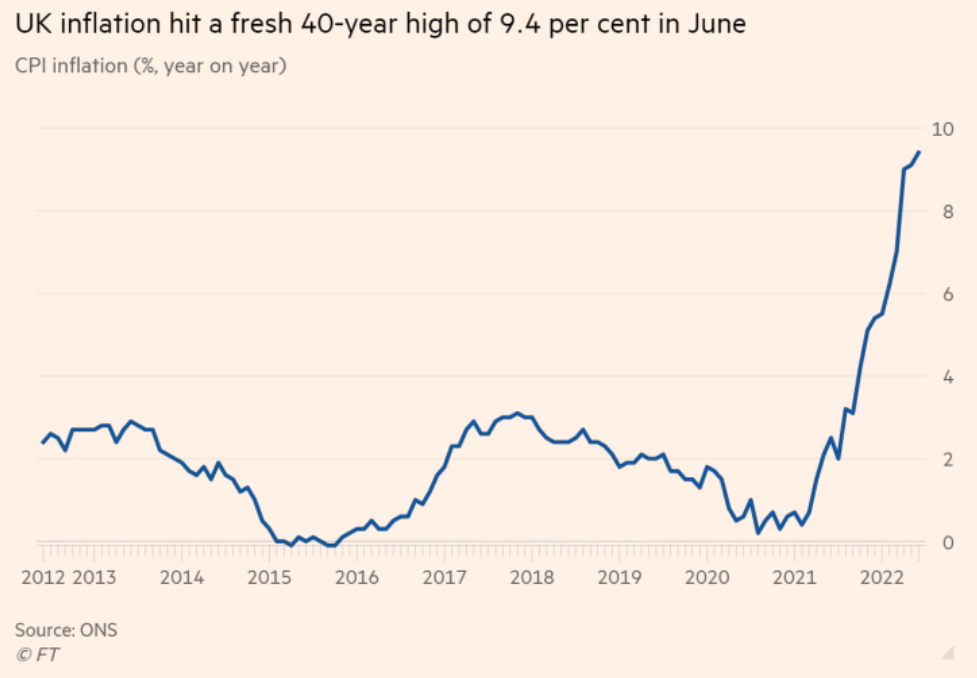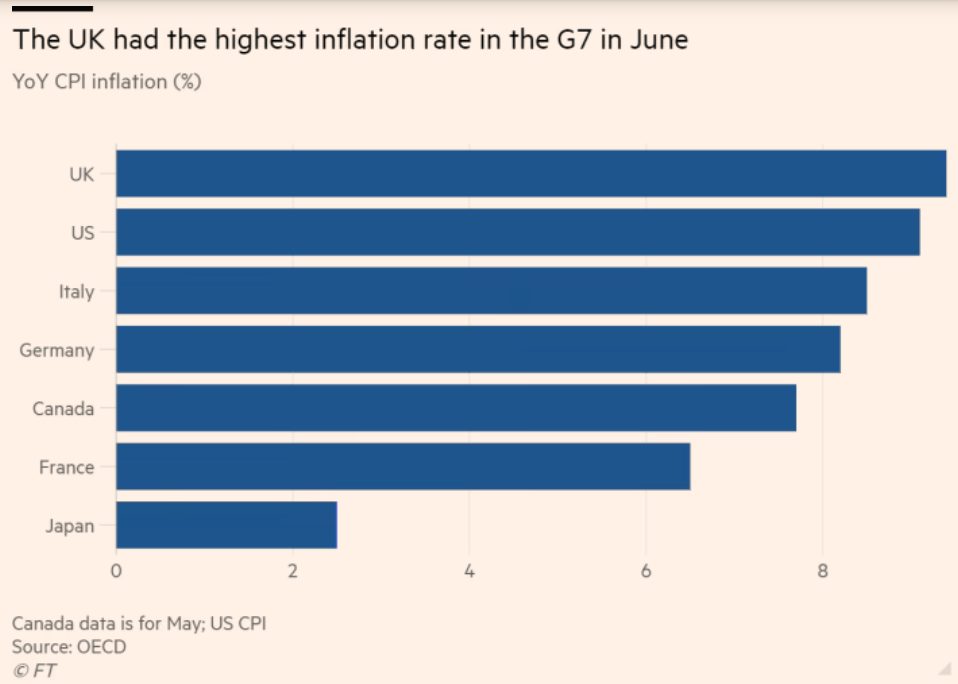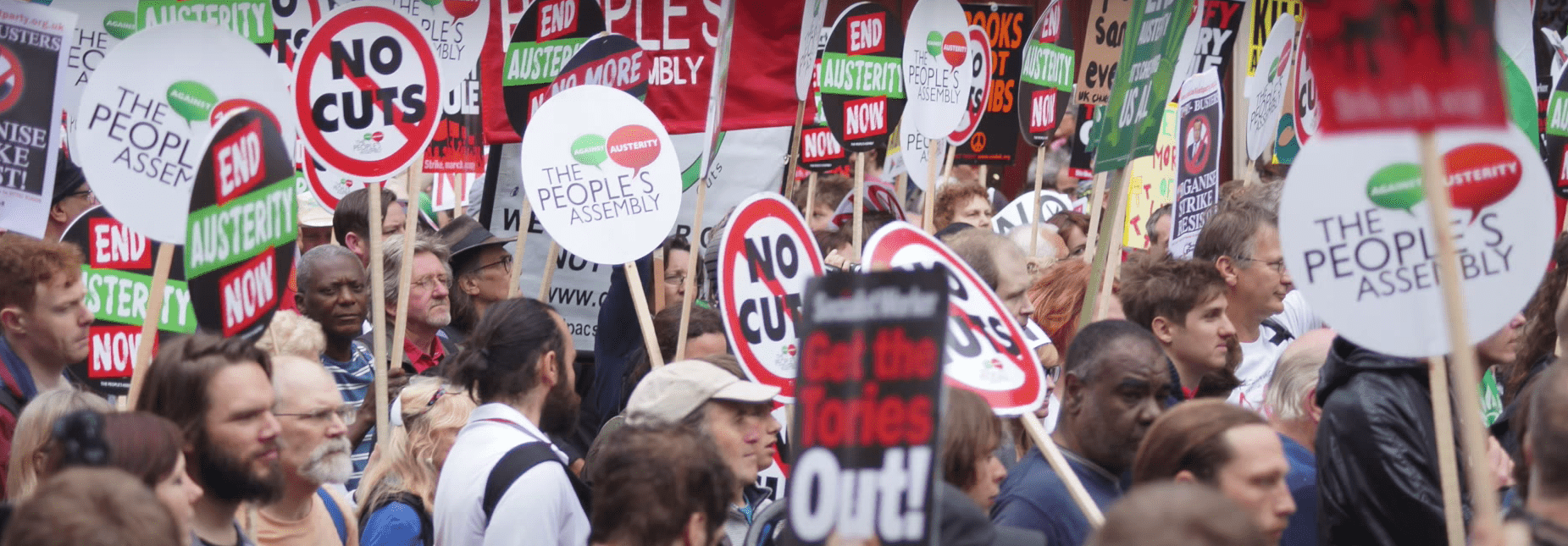As the CPI inflation rate officially hits 9.4%, having risen for nine months in a row, for most workers the real increase in the cost of living is much more than that. Paying a higher proportion of their income on food, housing, energy and transport, the real cost of living increase for most is now well into double figures. The figure for the RPI (Retail Price Index), for example, is already 11.8%
The chief economist of the Office for National Statistics told the Guardian (July 20), “Annual inflation again rose to stand at its highest rate for over 40 years. The increase was driven by rising fuel and food prices; these were only slightly offset by falling second-hand car prices”. Workers are not going out every day to buy second-hand cars, but what they cannot do without is food, gas, electricity and a roof over their heads.
The price of motor fuels have risen by 42% in a year; food, even on official figures, has risen by 9.8% and more price increases are in the pipeline, notably (but not exclusively) energy costs in October. Even the ONS has said that workers face a record cut in real-terms income.

It is all the more galling, therefore, that the Tories have decided to offer two and a half million public sector workers a pay rise well below the increase in living costs. They are demanding, in effect, that workers pay for the economic problems of UK plc by a cut in their living standards, while profits soar, company dividends go up and executive pay is out of control. The Resolution Foundation noted (Guardian, July 20) that the top 1% of earners have had pay rises averaging 11%.
TUC has a mandate for coordinated action
Faced with the biggest hit on their cost of living for decades many thousands of workers have announced strike action for a decent pay rise, notably rail workers in the RMT and ASLEF. But many other sections of workers have already balloted, like the CWU, or are in the process of preparing ballots, like PCS, the UCU, the RCN, and both of the big teacher unions.
Barristers and doctors – not groups usually associated with the labour movement – are also either organising or are about to organise industrial actions. It is almost easier to list which groups of workers are not organising some kind of action.
The common feature in all of these disputes is that workers are only seeking to maintain their living standards. They are not being ‘greedy’, merely asking to stay where they are. But workers in many of these unions will be asking the obvious question: given the fact that all of these unions are fighting for the same thing, why is there no coordinated action on wages?

The TUC organised a very good demonstration in London a month ago, but thousands marching from one part of Central London to another part of Central London changes nothing. Unless the TUC leadership is prepared to call unions together to facilitate some kind of coordinated strike action, then demonstrations of that kind will be seen as just letting off steam. All the fiery speeches in the world from Francis O’Grady do not remove the moral obligation that the TUC General Council has to provide a real leadership.
There is even a TUC mandate for coordinated action. At the last General Council meeting, Mark Serwotka, PCS General Secretary, proposed that a meeting be convened of unions in both the public and private sectors which are currently considering disputes over cost of living related issues, with the aim of “coordinating campaigns and sharing information”. The General Council agreed to the proposal, so it now only remains to turn words into action.
Trade unions have a ‘legal’ mandate to strike on any chosen date
A national 24-hour strike involving all of those unions who already have a mandate for strike action – as well as others who soon will have a mandate – would be a far more effective signal to the government of the determination and the capacity of the unions to fight for their members. It would give all of the workers involved in the various public and private sectors a huge boost to see that theirs is a common fight with all workers.
Such co-ordinated action, escalated as necessary, would look and feel like a general strike, but trade union leaders could not argue that it was not within the law. Bob Crow, who was then leader of the RMT, showed the way in 2013 when he ‘legally’ called out Tube and rail workers over safety fears, on the same day that the London FBU were striking against fire and rehire.
Not least, coordinated national action would give a boost to workers who have not yet balloted or who may not even be in trade unions, to see that it is possible to put up a serious fight on living standards. The only way the trade unions will maintain the living standards of their members is by being prepared to engage in sustained, militant action and it is the best recruitment tool for the trade unions.
The attack on living standards is coordinated – so must the response be
If the leaders of the various trade unions are acting in good faith to defend their members’ living standards, there is no reason whatsoever why they should not cooperate through the medium of the TUC, and if necessary, outside the structures of the TUC, to put up a more effective fight. Unfortunately, it is not customary for the bigger trade unions like Unite – almost a mini-TUC with different industrial sectors – even to coordinate actions of their own members. That has to change.

Extraordinary times demand extraordinary measures, and if the trade union leaders are serious about fighting for their members, they cannot fail to see the advantage of coordinated national strikes, on set days. We do not think that the trade unions should be beholden to anti-strike laws to hold their members back, but where unions have already conducted ballots, they have a ‘legal’ mandate to strike on days chosen by the union, so ‘legality’ is not an issue.
After all, who can deny that the hit on living standards by employers and the government – even to the point of facilitating the use of agency labour as scabs – is coordinated? Fire and re-hire is no longer a one-off event, but a strategy synchronised by employers all over the country and supported by the government. The offensive against living standards is coordinated – so must the response be.
A national one-day coordinated strike is political
We can anticipate, of course, that the Tories and their tame mainstream media will condemn any coordinated strike days of action as ‘political’. So they would be, but the decision of the Tories to implement a below-inflation pay rise, while they let dividends rip and executive pay to soar, is also political. When the Governor of the Bank of England calls for restraint in pay for all workers across the board, that is also a political statement.
A coordinated strike or strikes will undoubtedly be a political act, but it is one that could galvanise workers in all sectors of industry, public and private, demonstrating their power as workers. Above all, it would be a demonstration of the power of the working class.
Ultimately, living standards will only be guaranteed by political acts, by the transformation of society from a system based on private greed and profit to one based on public ownership and common need. That is why the industrial struggles of workers cannot be isolated from the struggle for a Labour Party that reflects workers’ needs, instead of one dominated by leaders who consistently refuse to back workers on strike.
Where we are today is that workers are moving into action almost spontaneously and putting pressure on their organisations to act, merely to defend what they have, or to regain what they’ve lost. All socialists and activists have to support that struggle.
Most boardrooms could disappear overnight and society could still function without them. The City of London, where money is made from money, is a parasitic growth on society that could also disappear without most people noticing. But manufacturing, industry, transport, utilities, and every public service only operates thanks to the daily efforts of its workers. It is time those workers were given the opportunity to demonstrate their real value, and their real power, in the best and most effective way possible.



